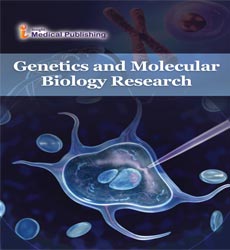The Human Microbiome and Host Genetic Interactions
Corresponding author:
Taylor Cadwell,
Department of Translational Medicine and Surgery, Catholic University of the Sacred Heart, Rome, Italy,
Email: cadwell.taylor@cush.it
Received: January 03, 2025, Accepted: January 24, 2025, Published: January 31, 2025
Citation: Cadwell T (2025) The Human Microbiome and Host Genetic Interactions. Genet Mol Biol Res Vol No: 9 Iss No.1:1
Introduction
The human body is home to trillions of microorganisms, collectively known as the microbiome, which play crucial roles in health and disease. From aiding digestion to modulating immune responses, the microbiome represents an essential partner in maintaining physiological balance. However, its influence is not independent; host genetics significantly shape the composition, diversity, and function of microbial communities. Understanding the complex interactions between the human genome and microbiome is essential to deciphering disease susceptibility, personalized medicine, and novel therapeutic strategies [1].
Description
Host genetic factors are known to regulate microbial colonization by influencing the immune system, mucosal barriers, and metabolic pathways. Genes involved in innate and adaptive immunity, such as those coding for pattern recognition receptors and cytokines, determine how the body recognizes and responds to microbes. Variations in these genes can create differences in microbial composition between individuals, contributing to unique microbiome profiles. For instance, genetic polymorphisms linked to inflammatory bowel disease (IBD) have been shown to alter gut microbial diversity, leading to a pro-inflammatory environment that exacerbates disease [2,3].
Moreover, the microbiome itself can influence host gene expression through metabolites and signaling molecules. Short-chain fatty acids (SCFAs), produced by bacterial fermentation of dietary fiber, modulate gene activity in epithelial and immune cells, promoting anti-inflammatory effects and strengthening intestinal barriers. In this way, microbial metabolites serve as turn; the microbiome affects genetic expression and function [4].
Recent advances in metagenomics and genome-wide association studies (GWAS) have provided valuable insights into the co-evolution of humans and their microbiota. Studies suggest that certain genetic backgrounds favor colonization by specific microbial taxa, while loss of microbial diversity may trigger dysregulation of gene networks involved in metabolism and immunity. These findings open possibilities for precision medicine, where both genetic predispositions and microbiome signatures can be used to predict disease risks and design personalized therapies. Microbiome engineering, probiotics, and dietary interventions tailored to an individualâ??s genetic profile may represent the future of healthcare [5].
Conclusion
The interplay between the human microbiome and host genetics represents a dynamic relationship that profoundly influences health outcomes. Genes shape microbial diversity and activity, while microbes, in turn, regulate host gene expression and immune function. As research in this field expands, it is becoming increasingly evident that neither genetics nor the microbiome alone can fully explain human health and disease. Instead, it is their intricate interactions that hold the key to personalized medicine, preventive healthcare, and innovative therapeutic approaches. Understanding this partnership marks an important step toward unlocking new frontiers in human biology.
Acknowledgement
None.
Conflict of Interest
None.
References
- Scarpellini E, Basilico M, Rinninella E, Carbone F, Schol J, et al. (2021). Probiotics and gut health. Minerva Gastroenterol67: 314-325.
Google Scholar Cross Ref Indexed at
- Attaye I, Warmbrunn MV, Boot AN, van der Wolk SC, Hutten BA, et al. (2022). A systematic review and meta-analysis of dietary interventions modulating gut microbiota and cardiometabolic diseases—striving for new standards in microbiome studies. Gastroenterology, 162: 1911-1932.
Google Scholar Cross Ref Indexed at
- Qin J, Li R, Raes J, Arumugam M, Burgdorf KS, et al. (2010). A human gut microbial gene catalogue established by metagenomic sequencing. Nature: 59-65.
Google Scholar Cross Ref Indexed at
- Saris WH, Tarnopolsky MA (2003). Controlling food intake and energy balance: Which macronutrient should we select?. Curr Opin Clin Nutr Metab Care: 609-613.
Google Scholar Cross Ref Indexed at
- Shivaji S (2017). We are not alone: A case for the human microbiome in extra intestinal diseases. Gut Pathog 9: 13.
Open Access Journals
- Aquaculture & Veterinary Science
- Chemistry & Chemical Sciences
- Clinical Sciences
- Engineering
- General Science
- Genetics & Molecular Biology
- Health Care & Nursing
- Immunology & Microbiology
- Materials Science
- Mathematics & Physics
- Medical Sciences
- Neurology & Psychiatry
- Oncology & Cancer Science
- Pharmaceutical Sciences
